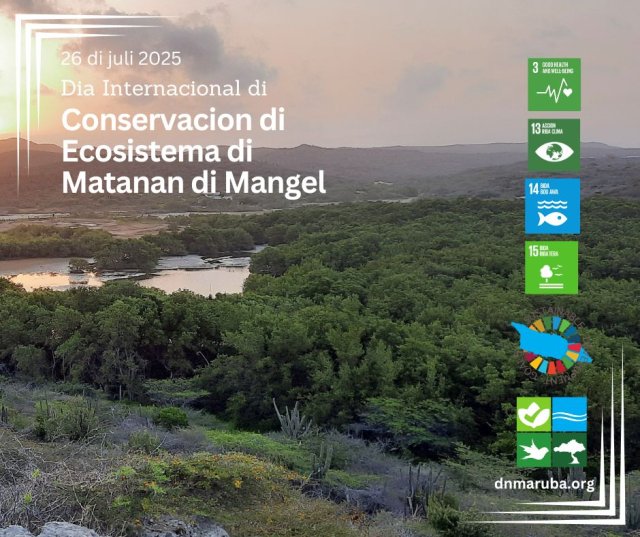International Day for the Conservation of Mangrove Ecosystems.
ORANJESTAD—We celebrate International Mangrove Conservation Day, also called International Mangrove Day, every year on July 26.
On this date, we raise awareness regarding the significance, promotion, conservation, and sustainable management of mangrove ecosystems.
It is an ecological observation established by the United Nations Educational, Scientific and Cultural Organization (UNESCO) in 2015. This day was first celebrated in 2016 and draws attention to the immense value of mangrove trees, their unique role in the health of our planet, and the urgent need for their conservation. The importance of mangrove trees is remarkable at the intersection of land and sea. The Department of Nature and Environment (DNM)'s responsibility includes providing accurate and detailed information about this valuable ecosystem, which is particularly significant for Aruba.
Because they improve biodiversity, protect shorelines, and absorb and store carbon (CO₂), mangrove habitats are crucial for coastal areas. They form natural coastal barriers against storms and cyclonic tides, which makes this ecosystem so important in our fight against climate change. Additionally, millions of people worldwide living in coastal and indigenous communities depend on this ecosystem for their food security. UNESCO reported that some countries lost more than 40% of their mangrove trees between 1980 and 2005. It makes ecosystem conservation more urgent on international meeting agendas. People in Aruba are chopping down mangrove trees without realizing how crucial these plants are to our island. It is happening on the reef islands (on the falls), where people do business with nature without respecting these protected trees.
Mangrove forests here in Aruba provide habitat for several species, including fish, crabs, lobsters, horses, soldiers, etc. (crustaceans), insects, and birds, which makes them vital to maintaining biodiversity. These ecosystems safeguard infrastructure and coastal communities by acting as organic barriers against coastal erosion, tsunamis, and poor weather. The phenomenon of capturing carbon in the atmosphere is also a service of this ecosystem of mangrove trees. Because Aruba is a SIDS island (Small Island Developing State), it is susceptible to the effects of climate change, including rising sea levels. And capturing carbon from the atmosphere helps mitigate climate change.
This day is not only to emphasize the importance of mangrove trees but also to voice the importance of ecological rights. The day stands for environmental justice, inclusion, and shared responsibility to maintain the systems that sustain life. This day reinforces the deep connection between ecological integrity, human dignity, and global resilience. International Mangrove Ecosystem Conservation Day 2025 focuses on the critical role of mangroves in coastal protection, climate change mitigation, and biodiversity conservation.
It emphasizes the vital importance of mangrove trees as a nature-based solution for a sustainable future. These nature-based solutions are effective in capturing and storing carbon.
Through this publication, DNM wishes to make a collective call for ecological awareness. The call includes initiatives aimed at young people, like storytelling and art creation, to draw attention to the importance of preserving local ecosystems. It also strives to honor the mangrove ecosystem, honoring the essential connection between nature's health and our well-being. Happy International Mangrove Ecosystem Conservation Day 2025.

